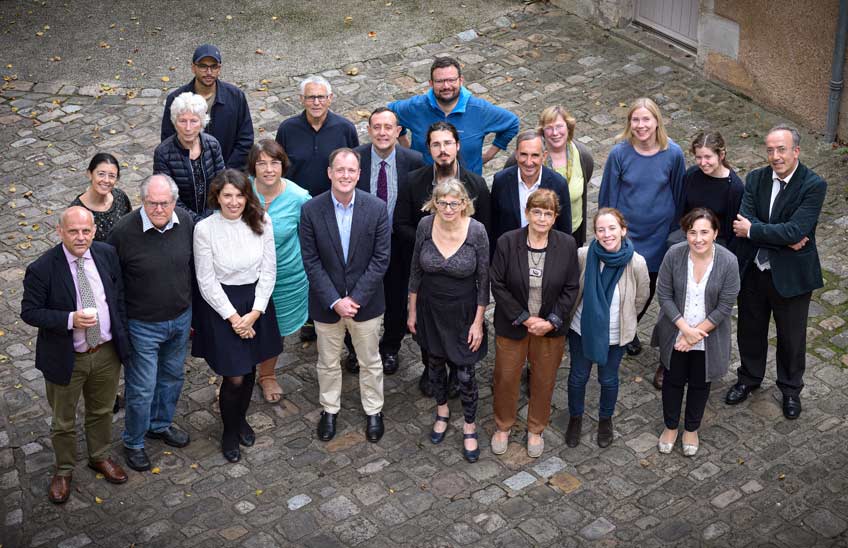"Charisma allows us to discover personal actions that help to decisively transform society."
Jaume Aurell, researcher of Institute for Culture and Society, has co-organized a congress on charisma in the Middle Ages. average

FotoCedida<br>/Una veintena de investigadores internacionales asistieron al congreso celebrado en la Universidad de Poitiers.
07 | 11 | 2022
"The analysis of charisma allows us to discover personal actions that help to decisively transform society at a given moment". This is the opinion of Jaume Aurell, researcher of the group 'Religion and Civil Society' of the Institute for Culture and Society (ICS) of the University of Navarra in the framework of the congress 'Charisma in the Middle Ages'.
The event was held October 21-22, 2022 in Poitiers and was co-organized by the ICS and the Centre d'Études Supérieures de Civilisation Médiévale of the University of Poitiers and funded by the Ministry of Science and Innovation of the Government of Spain. As many as 15 experts from universities in Spain, the United States, Finland, France, Portugal and Romania participated.
During the congress, there was a debate on the concept of charism in the Age average and, in addition, a proposal was made to give a new meaning to the current idea of charism. According to Aurell, the meaning of this concept has varied throughout history. Today, we rely on Max Weber's definition from the early 20th century: charisma is leadership, a person who attracts others and is able to lead projects, but whose benefits revert to himself. However, during the Middle Ages, charisma was understood according to St. Paul's description in his letter to the Corinthians: "A gift that is infused in service to the community or society," explained the expert.
A new sense of charisma?
For researcher, recovering the Pauline sense of charism can be very "interesting" since "it refers much more to categories related to service, to donation, to submission and not so much to the adulation of charismatic personalities," he said. He assured that, from this perspective, the charismatic leader is aware that he has received a gift freely and, therefore, offers it in a disinterested way.
In contrast, with the Weberian idea, charisma seeks the leader's own profit. Aurell explained that this generates both economic problems -some capitalist leaders end up being predators of the system- and political problems. The expert warned that politics based on this idea of charisma can lead to irrationality and populism. Leaders end up being flattered and their followers are manipulable: "Flattery of the leader has irrational connotations because, in the end, the leader's own advantage is being sought". Two examples of the misuse of charisma would be Hitler and Stalin in the 20th century.
In this sense, during the congress the idea of what leadership is used for was highlighted. "Medieval intellectuals distinguished that charisma does not necessarily enrich the person who receives it," Aurell pointed out. He has added that the event did not make a criticism of the Weberian position, both conceptions were considered to be useful conceptual tools. "Max Weber sample a reality of how society is evolving," he said, although he regretted that, at present, we only rely on Weberian charisma.
According to the expert, returning to St. Paul's definition in politics could provide more solid, sincere and realistic leaders. Moreover, in populism, the figure of the people ends up being something very abstract and manipulable. He stressed that "the reality of the Pauline charism financial aid is to singularize, to individualize, to personalize the responsibilities of each person.
"Charisma is very relevant for the knowledge and the analysis of society and for its improvement," he said. For researcher, this concept allows us to understand that there are forces in society that go beyond the quantitative, the utilitarian, that there are other forces that influence and move people.
Types of charisma
During the congress, three types of charisma were defined: that of staff, that of objects and that of shared charisma. Of the first, Aurell has given examples of personalities from different fields who had a positive influence on the societies of their time, such as Saint Francis, framework Polo, Machiavelli or Dante. "framework Polo reflects in his personality a series of attitudes, virtues, values... that are being generated in the new commercial societies," he explained. Currently, we could highlight the charisma of film and music stars, influencers, etc.
Charismatic objects include relics, monuments or family memories. When an object is charismatic it means that it is materializing a person.
Regarding the shared charism, the expert highlighted the Franciscan movement: "St. Francis transmitted a spirit to the Franciscans and they decisively transformed society, also in economic matters". This concept can be transferred to any community that shares a received idea or tradition, which includes from a nation to a family. "There is a very marked idiosyncrasy, transmitted by a founder or received by tradition, which generates a series of shared movements of the same identity, the same way of doing things... It is reflected in each of its members," he concluded.
The congress is part of the project of research 'El carisma en la España bajomedieval: Gobernantes, ceremonias, objetos' led by Jaume Aurell and Álvaro Fernández de Córdova at the group 'Religion and Civil Society' of the ICS and funded by the Ministry of Science and Innovation.
